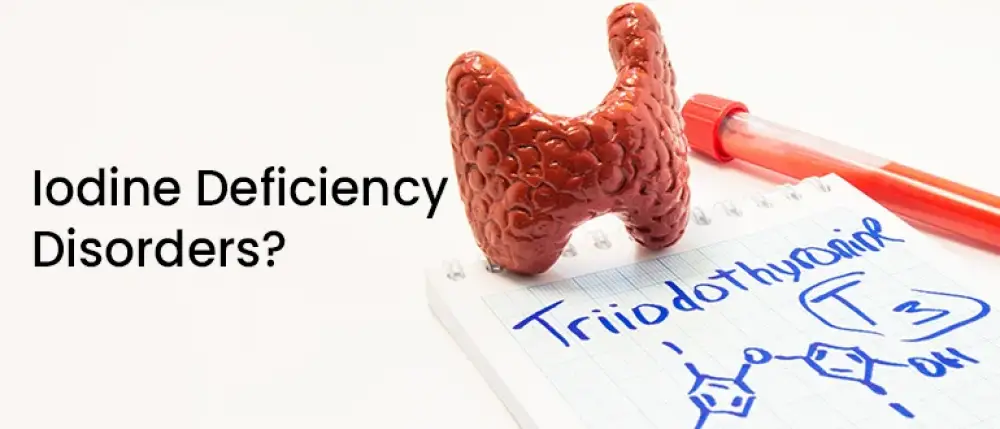Iodine is an essential micronutrient needed to make thyroid hormone and for brain development. An average daily intake of 100-150 micrograms of iodine is necessary for normal human growth and development. Iodine is essential for pregnant women and lactating mothers, as a deficiency can negatively impact fetal development and restrict a child's growth in the early years of life. A deficiency of iodine can cause Iodine deficiency disorders like goitre, hypothyroidism, etc. These diseases are incurable but preventable.
This blog will talk about the lack of iodine diseases and what are the main causes of iodine deficiency.
Iodine Deficiency Disorders
Iodine Deficiency Disorders (IDD) is a collective term assigned to the full spectrum of disease caused due to deficiency of Iodine. Iodine deficiency causes many thyroid-related disorders because the thyroid gland cannot synthesise thyroid hormones triiodothyronine (T3) and thyroxine (T4). These hormones regulate the body’s metabolism, and body temperature and are important for the early development of the brain and organs. The table given below presents the spectrum of IDDs at different life stages.
Foetus
- Abortions
- Still Births
- Congenital Anomalies
- Increased Perinatal and Infant Mortality
- Neurological Cretinism
- Myxedematotous Cretinism
- Psychomotor Defects
Neonate
- Neonate Goiter
- Neonate Hypothyroidism
Child and Adolescent
- Goiter
- Juvenile Hypothyroidism
- Impaired Mental function
- Retarded Physical Development
Adult
- Goiter
- Hypothyroidism
- Impaired Mental Function
Deficiency of Iodine Causes which Disease?
To understand, how deficiency of iodine leads to which disease keep reading further:
Goiter
Goitre is caused by the deficiency of iodine, which leads to the thyroid gland producing more cells in an attempt to make thyroid hormones. The disorder is characterised by an enlarged thyroid gland, which can range from small to large depending on the severity of iodine deficiency. Goiter can have various causes, and therefore, the treatment depends on the specific cause of the disease. If goitre is caused due to deficiency of iodine, it can be prevented by ensuring a healthy intake of iodine in your diet or consuming iodised salt.
Symptoms of goitre include
- A lump in the neck
- Swelling in the veins of the neck
- A hoarse voice
- Wheezing
- Difficulty in swallowing
Hypothyroidism
Hypothyroidism is one of the most common disorders of iodine deficiency. Iodine deficiency affects the normal functioning of the thyroid gland causing an underactive thyroid (hypothyroidism). Hypothyroidism is more prevalent in older women after their menopause.
Common symptoms are
- Fatigue
- Numbness in hands
- Weight gain
- Constipation
- Mood swings
- Cold sensitivity
- Dry skin and hair
Congenital Iodine Deficiency Syndrome (Cretinism)
Congenital Iodine Deficiency Syndrome (CIDS) is a medical condition present at birth that results in impaired mental and physical development due to insufficient thyroid hormone (Hypothyroidism). The main cause of CIDS is insufficient dietary intake of iodine during pregnancy or an underactive thyroid gland. This condition can be treated if diagnosed early through newborn screening of thyroid function and lifelong administration of thyroid hormone.
Iodine deficiency hypothyroidism has the following symptoms
- Stunted growth
- Short stature
- Neurological impairment
- Speech and hearing defects
- Goiter
- Inability to maintain balance and posture.
Causes of Iodine Deficiency Disorder
Some of the major causes of iodine deficiency that results in iodine deficiency disorder are:
1. Insufficient Intake in Diet
A lack of iodine in the diet leads to iodine deficiency. Focus more on Iodin-rich food such as seafood, iodised salt and dairy products.
2. Pregnancy
Pregnant women have high iodine requirements, which, if not fulfilled, can cause severe iodine deficiency both in the mother and the child.
3. Restrictions in Diet
Many people follow certain restrictions in their diets for medical reasons or sometimes due to personal choices. For example, consuming low-sodium salt or avoiding dairy, such restrictions can lead to iodine deficiency.
4. Iodine-Poor Soil
Areas with low iodine in the soil produce crops low in iodine content. This leads to iodine deficiency in the population of that area. The Indian subcontinent has many regions with iodine-poor soil.
5. Geographical Location
People living in mountains or areas far from coastal regions are more prone to iodine deficiency due to low consumption of seafood.
>> Also Read: Achieve Good Health with Foods Rich in Nutrients
Prevention of Iodine Deficiency
Some simple ways to prevent iodine deficiency are:
- Use iodised salt.
- Consume food rich in iodine, such as certain fish, seafood, milk, yoghurt and cheese.
- Vitamins and supplements recommended by a nutritionist or a doctor for pregnant and breastfeeding women.
In Conclusion
Iodine deficiency can lead to iodine deficiency disorders resulting in low metabolism, impaired mental function and birth defects. Hence it is important to maintain an optimum level of iodine intake. Expecting and breastfeeding mothers should take special care of their diet as iodine is an important element in maintaining proper thyroid function, which is essential for the overall development of the foetus. Getting yourself screened and examined in case you experience any of the above-mentioned symptoms is how you can detect a deficiency in an early stage.
In addition to all these precautions, one should also invest in a comprehensive health insurance policy that takes care of all your health care needs. You can explore various health insurance coverage options at Care Health Insurance and get the best suitable plan as per your requirements. We ensure best possible medical assistance in the times of need at more than 22100+ cashless healthcare providers.
Disclaimers: All plan features, benefits, coverage, and claims underwriting are subject to policy terms and conditions. Kindly refer to the brochure, sales prospectus, and policy documents carefully.
